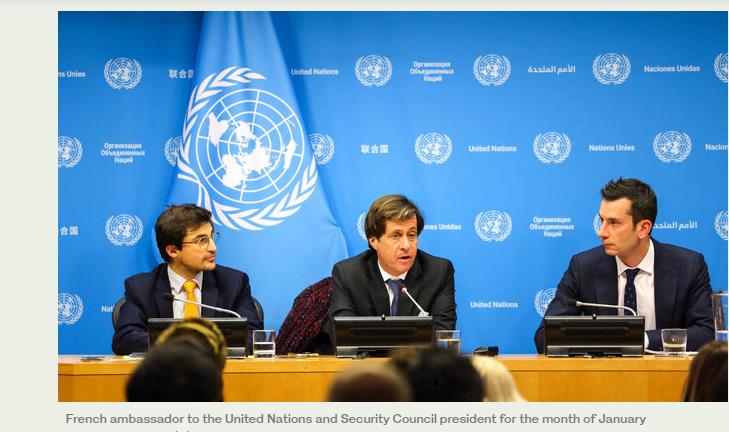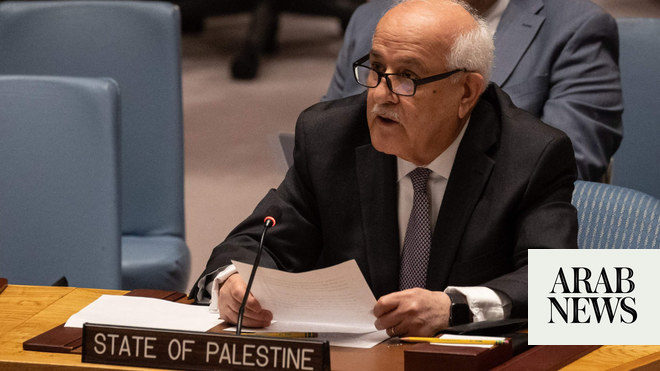
Ambassador Taher Elsonni warns freeze on Libya’s assets is being ‘politicized,’ and accuses Belgium of embezzlement over funds seizure
Council members call on Libyan authorities to support December election process, and address inhumane treatment of migrants in detention centers
NEW YORK: Libya’s UN envoy has told the Security Council it has a “moral responsibility” to correct past mistakes against the Libyan people and called for an end to foreign interference in the country’s affairs.
Speaking ahead of Libya’s landmark presidential and national elections in December, Ambassador Taher Elsonni said that Security Council members must acknowledge their role in “the developments in my country over the past years.”
He told the Security Council meeting on Wednesday that “the Libyan people will recover from this crisis,” and added: “We will become stronger.”
Discussing the situation in Libya, council members voiced hopes that the elections will be held in a free and fair atmosphere, and called on all parties to resolve disputes through legitimate means and refrain from disrupting the political process.
Although they welcomed a recent agreement on the withdrawal of foreign fighters and mercenaries, council members also called on Libya to do more to address its humanitarian challenges amid increasing reports of inhumane treatment of migrants in detention centers in the country.
Ambassador Jeffrey DeLaurentis, senior adviser for special political affairs at the US Mission, welcomed the “unambiguous demonstration of international support for Libya” at the Paris conference this month, but reminded “those who would interfere with Libya’s elections or stoke violence that the Security Council may impose sanctions on anyone — Libyan or otherwise — who obstructs or undermines the elections..”
He said the council “must target election spoilers to promote accountability if need be.”
Russia’s Deputy Permanent Representative Dmitry Polyanskiy highlighted Moscow’s support for the repatriation of foreign mercenaries in order to avoid “the risk of damaging the existing cease-fire” and urged all groups to “work constructively with one another.”
Russia’s support for the Libyan National Army includes mercenaries from the Russian private security company Wagner Group.
However, Elsonni cautioned the envoys against “belittling Libyan citizens, especially the youth, who are now more aware of the history of their country in the past 10 years of conflict.”
Libyans “have uncovered everything that happened and all the conspiracies against them,” he added.
“You have seen genuine national reconciliation and synergy. We are turning the page on a painful chapter in the history of Libya.”
Elsonni reassured the council that “the Libyan people will recover from the crisis and will become stronger.”
He added: “We are only asking those who are interfering in our internal affairs to stop, and, as we say in Libya, ‘just leave us alone.’ Despite all challenges, we remain steadfast, one and united: This is the secret of our strength, no matter what.”
Libya “appreciates” international initiatives in pursuit of a peaceful solution, but the process must be owned and led by Libyans, who “must lead and not be led,” Elsonni said.
The present authorities in Libya are committed to a roadmap that stipulates the holding of elections on time and ensuring their success, he said.
“The sovereign demands of the Libyan people to end any form of foreign presence in Libyan territory, regardless of labels or categories, must be honored.”
Turning to his country’s frozen assets, Elsonni said that this was no longer an attempt to protect Libyan money but “a politicized mechanism aimed at allowing some to usurp the treasures of the Libyan people.”
Last week, AFP reported that Libyan Prime Minister Abdul Hamid Dbeibeh has accused Belgium of seeking to seize $15 billion in Libyan assets frozen by the UN since the beginning of the Libyan conflict in 2011.
“It is regrettable to inform you that we are being embezzled again,” Elsonni told the Security Council, warning against this “dangerous precedent.”
Libya’s assets in Belgium are the subject of a decade-old dispute after the Global Sustainable Development Trust, a charity owned by Belgian Prince Laurent, invested millions of euros in a reforestation scheme during Muammar Qaddafi’s rule, a project that was never completed due to the toppling of the dictator. The prince has been seeking compensation ever since.
“Any conflict or dispute must be solved between governments, and it should not come as a threat to citizens” Elsonni said as he called on Brussels to refrain from “provocative” actions and work with the Libyan government toward a diplomatic solution to the issue.
The Libyan envoy asked the Security Council and sanctions committee to honor commitments to protect Tripoli’s assets, and urged all countries “not to prejudice this money or seize it under any pretext in a clear violation of the council’s resolution.”
Elsonni reiterated that specialized Libyan institutions are conducting investigations into alleged war crimes and crimes against humanity committed during the Libyan conflict.
“Those have no statute of limitations,” he said, adding that the discovery of mass graves in Libya “will always be a dark spot in our history.”
The meeting on Wednesday was also the last at which UN Libya peace envoy Jan Kubis briefed the council following his resignation this week, citing personal reasons.
Elsonni said that he regretted Kubis’ resignation “at this critical time,” and called on UN Secretary-General Antonio Guterres to clarify UN plans for the support mission’s leadership.











